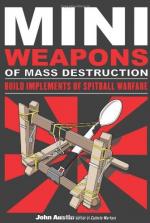|
This section contains 391 words (approx. 2 pages at 300 words per page) |

|
During the Gulf War, Iraq admitted to having produced 260 liters of VX gas and 2,265 gallons of the anthrax bacteria—substances that are lethal in infinitesimal quantities. As a condition of the war’s cease-fire, Iraq agreed to allow United Nations inspectors to destroy these weapons. However, because chemical and biological weapons facilities are easy to conceal—either by transporting the facilities themselves or by converting them to legitimate laboratories—Iraq has successfully kept its weapons hidden from UN inspectors.
Iraq’s evasion of weapons inspectors has instigated debate over whether treaties or other agreements can adequately verify that countries are not producing or stockpiling chemical and biological weapons. Currently the possession of chemical and biological weapons is outlawed by two treaties: the Biological and Toxin Weapons Convention and the Chemical Weapons Convention. Experts disagree, however, about...
|
This section contains 391 words (approx. 2 pages at 300 words per page) |

|




